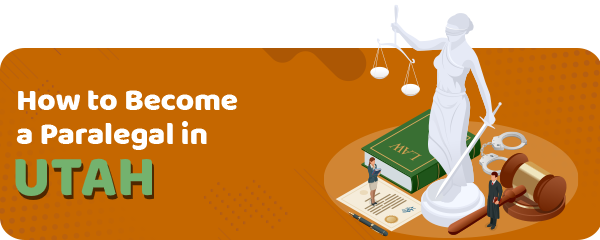Learning how to become a paralegal in Utah will provide you with an excellent start toward a law career.
You can earn a substantial living, however, even if you never do end up becoming a lawyer.
Article Table of Contents
Licensing Requirements to Become a Paralegal in Utah
One of the most helpful resources for you in Utah is the Paralegal Division of the Utah State Bar website.
It is more commonly known as “The Division.”
It will guide you concerning how to become a Licensed Paralegal Practitioner (LPP) in this state.
As reported in 2018, an LPP position gave UTAH law professionals the chance to carry out specific duties.
This includes some responsibilities paralegals may not have had in the past.
This became a way for people to seek legal counsel without having to always pay exorbitant lawyer fees.
The LPP doesn’t represent a client in court but does provide other services that an attorney would provide.
These LPP activities do not require attorney supervision:
- Assisting clients with custody and support issues or name changes
- Representing people with stalking issues or abuse
- Advising persons in separation or a divorce
- Providing legal aid for forced entry and detainment cases
- Fighting in small claim court against debt collectors
- Representing clients in a landlord-tenant dispute
Additional information is provided by The Division concerning becoming an LPP.
By the way, Utah does not require a license to become a Paralegal.
However, students usually seek certification via the National Paralegal and Legal Assistants Association (NALA).
You also can check with the Utah Paralegal Association (UPA) for assistance with becoming certified to work as a paralegal.
Two primary certificates typically earned include the Certified Paralegal (CP) and Advanced Certified Paralegal (ACP) credentials.
5 Paralegal Schools in Utah
1. Utah Valley University
https://www.utparalegalassn.org/
Your LPP training at Utah Valley will cover Debt Collection, Family, and Landlord/Tenant Law for LPP topics.
The time spent here will give you practice with entering into client contracts, interviewing people who may need legal help, and assisting patients with completing necessary legal forms.
The LPP training will take you about one year.
Keep in mind that this is different than the credentials you would earn to become a CP or ACP through NALA.
You will have to follow through with the LPP training and complete with UTAH Bar requirements.
2. Bryan University
Bryan University provides a Paralegal Studies and Litigation Technologies Program.
This training prepares you for taking the NALA CP exam, and the cost of this test and study materials are included.
Your Bryan University training will take you about as long or as little time as you want it to.
Expect to set aside at least a year or two for this accelerated program.
After your training is complete, you’ll be ready to assist attorneys with business, civil, and family cases.
You will also have the power to help out with investigative and legal research.
In addition, your courses will cover contract and criminal law topics.
This Paralegal Program includes a 100% online ELSSA simulation lab.
That is how you will prepare to deal with real-life scenarios as if already assisting a lawyer with cases.
This technology also prepares you for using the database and recordkeeping software you will be using as a Paralegal. Classes are also interactive.
3. Salt Lake Community College
http://www.slcc.edu/paralegalstudies/
Salt Lake Community College offers you at least two Legal Studies learning options.
These include both a certificate and an associate degree program, which take about one or two years to complete.
Both options enhance your training whether you already work as a paralegal or not.
Once you are done with this coursework, you will have the confidence to complete tasks normally done by an attorney.
The American Bar Association (ABA) approves this training for entry-level work and recertification.
Make sure you contact the ABA or the Utah Bar to confirm which exam this coursework would prepare you for.
After that, you should be ready to serve as a legal assistant if you also put in your hands-on training hours at a local law, corporate, or government office.
4. Utah Valley University
You might consider taking some Utah Valley University classes to enhance your current paralegal training.
It is also an excellent way to recertify and complete continuing education (CE) requirements, although Utah does not require CE credits for paralegals and legal assistants.
5. Ensign College
Your Paralegal Studies certificate or associate degree training at Ensign College gives you real-world experience.
This includes internship time and hours spent in a law firm, corporate legal department, or government office.
Average training time takes at least a year for the certificate program and two years for the associate degree program.
During your coursework duration, you will also have opportunities to connect with the state’s own Bar and Paralegal Association.
Your academic advisor will also help you prepare for transferring to another school if you want.
This will benefit you if you want to work toward becoming a lawyer.
Paralegal Schools in Utah – Summary Table
| School Name | Address |
|---|---|
| Utah Valley University | 800 W University Pkwy, Orem, UT 84058 |
| Bryan University | 350 W Washington St, Tempe, AZ 85281 |
| Salt Lake Community College | 4600 S Redwood Rd, Salt Lake City, UT 84123 |
| Utah Valley University | 800 W University Pkwy, Orem, UT 84058 |
| Ensign College | 95 N 300 W, Salt Lake City, UT 84101 |
Salary
In 2022, an entry-level Utah Paralegal can make an average of $56,986 per year.
The salary usually ranges from $50,397-$64,342.
If you continue to enhance your earnings with new certifications, you could make more than $71,040 per year.
Besides Salt Lake City, you can check other locations near you for jobs.
Some cities where they have postings include Saint George, Lehi, and Logan.
Annual Salary Range:| Location | Avg. Annual Salary |
|---|---|
| Salt Lake City | $57,159 |
| Logan | $54,939 |
| Provo | $55,065 |
| Sandy | $57,003 |
| Orem | $55,065 |
| Ogden | $55,721 |
| West Jordan | $56,951 |
| Layton | $55,513 |
| Lehi | $54,805 |
| St. George | $60,539 |
Regional Salary in Utah
| Region | Employed | Avg. Annual Salary | Avg. Hourly Pay | Top 10% Annual Salary | Bottom 10% Annual Salary |
|---|---|---|---|---|---|
| Logan, UT-ID | 40 | $51,580 | $24.8 | $71,580 | $37,450 |
| Ogden-Clearfield, UT | 270 | $53,620 | $25.78 | $75,840 | $37,690 |
| Provo-Orem, UT | 340 | $57,600 | $27.69 | $84,600 | $38,510 |
| St. George, UT | 130 | $50,760 | $24.4 | $65,150 | $39,930 |
| Salt Lake City, UT | 2,260 | $58,660 | $28.2 | $83,610 | $40,670 |
* Employment conditions in your area may vary.
Frequently Asked Questions
Do you need a degree to be a paralegal in Utah?
You do not need a degree, but enrollment in a certificate program will provide you with more job opportunities.
How much does the paralegal certification exam cost in Utah?
NALA certification exam application fees start at $125 for current students in their last semester if they are NALA members.
Fees for continued certification may range from at least $220-$275, depending on if you are in the military or you are a member of NALA or not.
Are you required to have a paralegal license in Utah?
Utah does not require a license to become an entry-level paralegal or legal assistant.
Most people will, however, take a year or two of schooling to prepare for certification exams.
How long does Paralegal training take in Utah?
Most people earn at least one certificate, which usually takes about a year to complete.
Other people might earn an associate degree.
People desiring to be an LPP often expand their training to a bachelor’s degree if they also aspire to become a lawyer.
Read the full guide: How to Become a Paralegal




